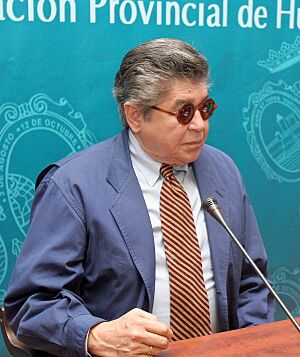Alfredo Bryce facts for kids
Quick facts for kids
Alfredo Bryce
|
|
|---|---|

Bryce in 2007
|
|
| Born | Alfredo Bryce Echenique February 19, 1939 Lima, Peru |
| Occupation | Writer |
| Alma mater | National University of San Marcos |
| Notable works |
|
| Notable awards |
|
| Spouse |
|
Alfredo Bryce Echenique (born February 19, 1939) is a famous Peruvian writer from Lima. He is known for his many novels and short stories.
Contents
About Alfredo Bryce Echenique
His Early Life and Education
Alfredo Bryce Echenique was born into a well-known family in Peru. He was the fourth of five children. His father was a banker, and his mother was related to a former Peruvian president.
He went to school in Lima, attending Inmaculado Corazón and Santa María. He also studied at Saint Paul's College, a British boarding school. His family wanted him to study law at the National University of San Marcos. He earned his law degree in 1964.
However, Alfredo Bryce Echenique loved literature more. So, he also studied literature at the same university. He completed his literature degree in 1963. In 1988, he also became a Spanish citizen, but he kept his Peruvian citizenship too.
Becoming a Famous Writer
In 1964, Alfredo Bryce Echenique received a special grant from the French government. This allowed him to move to Paris, France. Many other Latin American writers, part of a group called the boom, also moved to Paris around this time.
At the Sorbonne, he studied French literature for a year. After that, he lived in other places like Italy, Greece, and Germany. In Germany, he learned German with another grant.
He returned to France and taught Spanish from 1967 to 1968. In 1968, he published his first book, Huerto Cerrado. The next year, he started teaching Latin American literature at Paris Nanterre University. Later, in 1971, he taught at the Sorbonne. His famous novel, A World for Julius, came out in 1970.
Key Literary Works
In 1972, Alfredo Bryce Echenique won the Peruvian National Prize for Literature. He continued his studies and teaching in France. In 1975, he received a special grant called a Guggenheim grant. He also earned a master's degree in comparative literature.
In 1977, he went back to Peru. There, he earned his doctoral degree from San Marcos University. Later, he moved to Montpellier, France, to become a professor. In the 1980s, he settled in Spain, living in Barcelona and then Madrid. He returned to Peru in 1997, where he lives today.
His first book, Huerto Cerrado, was a collection of short stories. It was about a young boy named Manolo growing up in Lima in the 1950s. His first novel, Un Mundo para Julius, became a huge success. It is now considered a classic of Latin American literature.
The novel Un Mundo para Julius has been translated into ten languages. It tells the story of a young boy named Julius from a wealthy Peruvian family. Julius feels closer to the family's servants than to his own family. Through Julius's eyes, the author shows the big social differences in Peruvian society. He uses humor and irony to do this.
Later Novels and Style
Un mundo para Julius was just the beginning for Alfredo Bryce Echenique. He has written nearly twenty novels and many story collections since then.
He describes himself as a writer of the late 20th century. His writing style is often called "ironic realism" rather than "magic realism." This means he uses humor and a realistic view of life, instead of magical or fantastical elements. An example is his novel La amigdalitis de Tarzán (1999). This book tells the story of a difficult romance through letters. It's about a poor Peruvian musician and the daughter of a powerful family from El Salvador.
Like some of his characters, Alfredo Bryce Echenique lived away from his home city of Lima for many years. He returned there in 1999. That same year, he received an honorary degree from the Universidad Nacional Mayor de San Marcos.
Awards and Recognition
Alfredo Bryce Echenique has received many awards for his writing:
- Casa de las Américas Prize for Huerto cerrado (finalist), 1968
- Peruvian National Prize for Literature for A World for Julius, 1972
- Prix du Meilleur Livre Étranger (finalist), 1974
- Prix Passion, 1984
- Chevalier and later Official of the Ordre des Arts et des Lettres, 1984 and 1995
- Commander of the Order of Isabella the Catholic, 1993
- Dag Hammarskjöld Peace Prize, 1997
- National Literature Prize for Narrative of Spain for Reo de Nocturnidad, 1998
- Doctor Honoris Causa from San Marcos University, 1999
- Commander of the Order of Alfonso XII of Spain, 2000
- Grinzane Cavour Prize for Tarzan's Tonsillitis, 2002
- Premio Planeta de Novela for El huerto de mi amada, 2002
- FIL Literary Award in Romance Languages, 2012
See also
 In Spanish: Alfredo Bryce Echenique para niños
In Spanish: Alfredo Bryce Echenique para niños
- Peruvian literature
- List of Peruvian writers
 | James B. Knighten |
 | Azellia White |
 | Willa Brown |

